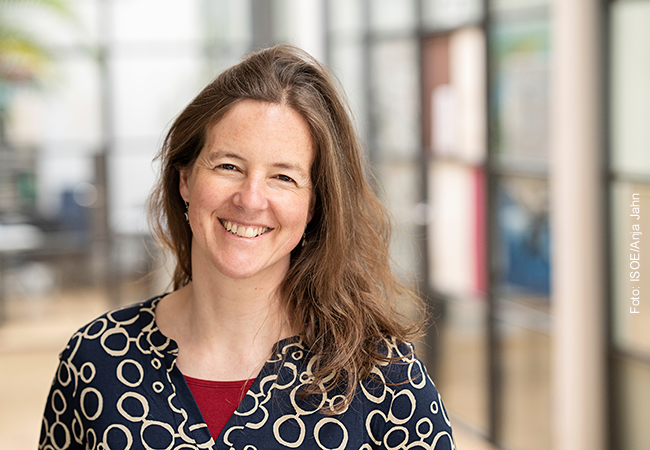In the winter semester of 2021/22, Flurina Schneider, scientific director of ISOE – Institute for Social-Ecological Research, will take up her professorship for Social Ecology and Transdisciplinarity at Goethe University Frankfurt. The joint professorship of the independent research institute ISOE and the university is the first with this particular focus in Germany. The inaugural lecture “Research for sustainable development – from knowledge processes and options for action” will take place on October 20, 2021 on the Riedberg campus.
Social ecology is still a comparatively young scientific field that has proven central to environmental and sustainability research in recent decades and is now for the first time entering university teaching with a professorship. Social ecology examines the relationships between society and nature and poses the question of how these relationships can be made more sustainable. Particular importance is attached to the role of knowledge processes. “In the search for science-based solutions to challenges such as climate change or biodiversity loss, social ecology, with its transdisciplinary approach, facilitates joint learning processes between science and society. That is why it plays a key role in sustainability research”, says Flurina Schneider, who will give her inaugural lecture at Goethe University Frankfurt on October 20, 2021.
Cooperation between ISOE and Goethe University in research, teaching and transfer
In Germany, social ecology was mainly developed by ISOE, which developed this transdisciplinary field of science in terms of their research program. “I am very pleased to take up the first professorship in this important field of science in Germany at Goethe University Frankfurt,” says ISOE’s scientific director Flurina Schneider. With the joint professorship in Social Ecology and Transdisciplinarity, which was created on the initiative of the independent research institute in Frankfurt and which is part of the Faculty of Biological Sciences, ISOE is intensifying its long-standing cooperation with Goethe University in research, teaching and transfer. Since 2008, ISOE’s scientists have been teaching theoretical concepts, methods, and empirical applications of social-ecological research as part of the environmental master’s program at Goethe University.
Anchoring the educational mandate for sustainable development in academic teaching
With the professorship, ISOE and Goethe University are also responding to the growing demand in the field of sustainability research and related research methods. “As a university, we take the mandate to anchor education for sustainable development in our courses of study very seriously,” says Enrico Schleiff, president of Goethe University Frankfurt. “We are therefore extremely pleased to have Flurina Schneider, an internationally renowned expert in Transdisciplinary Sustainability Research, as a professor for this chair, which is unique in Germany. Her expertise in scientific principles and methods with respect to socio-ecological transformation processes and sustainable development is not only a great asset for our range of courses, but also for the university as a whole: sustainability as the preservation of natural life-support systems and climate protection is a matter close to our hearts in research, teaching and administration.”
A professor with wide-ranging expertise in environmental and sustainability research
The Swiss sustainability researcher Flurina Schneider has been scientific director of ISOE since April 1, 2021. She is the successor of Thomas Jahn, who co-founded ISOE in 1989. Schneider completed her habilitation in 2016 on the topic of transdisciplinary and transformative research for sustainable governance of natural resources with a view to intra- and intergenerational justice at the University of Bern, where she had been employed as a researcher and head of the Land Resources Research Cluster since 2010. Her scientific activities span broad areas of environmental and sustainability research: from soil-conserving farming systems and quality assurance of eco-products to equity in land and water governance and research projects explicitly addressing the role of transdisciplinary knowledge production in sustainability transformations.
The importance of knowledge in sustainability processes
The role of knowledge in sustainability transformations is Flurina Schneider’s key research and teaching priority. She will address this topic also in her inaugural lecture. “It is crucial to understand the mechanisms by which scientific knowledge translates into societal action and what types of knowledges are needed for social-ecological transformations to actually succeed,” says Schneider. She will also focus on issues of environmental justice between the generations, as well as between countries in the global North and South. “I’m really looking forward to giving students access to all the complex issues and challenges of sustainability research.”
Inaugural lecture of Prof. Dr. Flurina Schneider
“Research for sustainable development – from knowledge processes and options for action”
Date: October 20, 2021
Time: start at 1 pm
Location: Lecture Hall 2 of the Otto Stern Center on the Riedberg Campus of Goethe University Frankfurt









